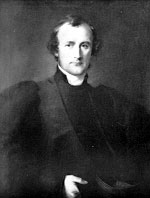Readings:
Ecclesiasticus 1:1-10
Psalm 21:1-4
Ephesians 2:8-10
Matthew 10:7-16Preface of a Saint (2)
[Common of a Missionary]
[Common of a Pastor]
[For the Ministry II]
[For the Mission of the Church]
PRAYER (traditional language):
Almighty and everlasting God, whose servant George Augustus Selwyn didst lay a firm foundation for the growth of thy church in many nations: Raise up in this and every land evangelists and heralds of thy kingdom, that thy church may proclaim the unsearchable riches of our Lord Jesus Christ; who liveth and reigneth with thee and the Holy Ghost, one God, now and for ever. Amen.
PRAYER (contemporary language):
Almighty and everlasting God, whose servant George
Augustus Selwyn laid a firm foundation for the growth of
your church in many nations: Raise up in this and every
land evangelists and heralds of your kingdom, that your
church may proclaim the unsearchable riches of our Lord
Jesus Christ; who lives and reigns with you and the Holy
Spirit, one God, now and for ever. Amen.
Lessons revised at General Convention 2024.
Return to Lectionary Home Page
Webmaster: Charles Wohlers
Last updated: 8 Feb. 2025
GEORGE AUGUSTUS SELWYN
BISHOP AND MISSIONARY (11 APR 1878)
 Selwyn
was born in London in 1809, educated at Eton and Cambridge and ordained
in 1833. In 1841, he was made first Bishop of New Zealand. He diligently
studied the Maori tongue on his long sea voyage, and was able to preach
in it on his arrival. He laid the foundations of the Church, not only
in New Zealand, but throughout the islands of Melanesia. (This was the
result of a clerical error. The northern boundary of his diocese was supposed
to be the parallel of latitude 34 degrees south of the equator. The official
document read "north" instead of "south," and Selwyn
cheerfully accepted responsibility for the vast Pacific regions of the
Melanesian and Polynesian islands as well as New Zealand. In 1957 the
Islands became a separate Province of the Anglican Communion.) In the
ten-year war between the Maoris and the European colonists, Selwyn managed
to keep the confidence of both sides, and ultimately at the first general
synod of the Church in New Zealand in 1859 to secure the adoption of a
Constitution that established the principle of full participation by Maori
Christians at all levels of Church government.
Selwyn
was born in London in 1809, educated at Eton and Cambridge and ordained
in 1833. In 1841, he was made first Bishop of New Zealand. He diligently
studied the Maori tongue on his long sea voyage, and was able to preach
in it on his arrival. He laid the foundations of the Church, not only
in New Zealand, but throughout the islands of Melanesia. (This was the
result of a clerical error. The northern boundary of his diocese was supposed
to be the parallel of latitude 34 degrees south of the equator. The official
document read "north" instead of "south," and Selwyn
cheerfully accepted responsibility for the vast Pacific regions of the
Melanesian and Polynesian islands as well as New Zealand. In 1957 the
Islands became a separate Province of the Anglican Communion.) In the
ten-year war between the Maoris and the European colonists, Selwyn managed
to keep the confidence of both sides, and ultimately at the first general
synod of the Church in New Zealand in 1859 to secure the adoption of a
Constitution that established the principle of full participation by Maori
Christians at all levels of Church government.
In 1867, Selwyn was pressured to accept appointment as Bishop
of Lichfield. Reluctantly, he returned to England, where he died eleven
years later.
by James Kiefer